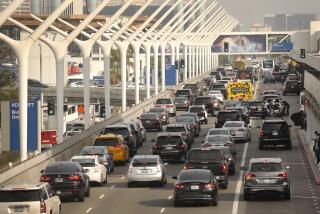SAN DIEGO HOST SUPER BOWL XXII : Lindbergh Field Braces for ‘Busiest Day’ in Its History
- Share via
Even before the final gun ended Super Bowl XXII on Sunday, employees and officials at Lindbergh Field began bracing themselves for what promised to be the heaviest 24 hours ever at the airport.
Airport officials estimated that 80,000 people would depart San Diego on scheduled flights, chartered jetliners and private aircraft Sunday night and today--50,000 more than on a normal day.
Jeral Reas, land-side traffic manager at Lindbergh Field, said it “should be the busiest day the airport has ever seen in its history.”
Airline officials, meanwhile, predicted delays of several hours because of the exodus of football fans.
“We do anticipate between one- and three-hour delays on flights because of the added volume of aircraft traffic,” said Jim Lippert, a supervisor at PSA. “We’ve been told by airport managers and supervisors from other Super Bowl host cities that we will be seeing something that we would not have anticipated.”
Taking Precautions
Police and airport employees were taking precautions to ease the crush of cars and bodies. Charter buses were diverted to a special departure point at the PSA terminal, while rental car agencies deployed teams of runners to pick up vehicles abandoned by fans rushing to catch planes.
Aside from the usual airport traffic and the influx of fans eager to return home after the Super Bowl, authorities were braced to tackle problems with nearby residents who vowed to stall traffic at Lindbergh to retaliate against the elimination of the nighttime curfew on takeoffs after the football game.
San Diego police assigned three patrol cars to the airport in hopes of dashing the plans, which organizers called to protest the San Diego Unified Port District’s recent decision to lift the 11:30 p.m. to 6:30 a.m. curfew for one night.
Officers were told to approach any drivers who appeared to be loitering and order them to move on or face a ticket. In addition, the police dispatched several motorcycle officers up and down Harbor Drive to keep the traffic moving.
As the crowd thickened later in the evening, the patrol cars swept periodically past the terminals like a mix-master to discourage any travelers from stalling the flow of cars.
‘Going to Inhibit Traffic’
“We have intelligence that” the protesters are going to come out, Sgt. S.G. Margells said early Sunday night. “The information we have is that they’re going to inhibit the movement of traffic.”
But by 9 p.m., no protest appeared to have materialized.
With the Washington Redskins firmly in control at San Diego Jack Murphy Stadium by the end of the first half, a number of fans began filing into the airport carrying their game cushions as early as 7 p.m.
By 7:30 p.m., a busload of skimpily dressed dancers from the Super Bowl halftime show pulled up at the airport. Other buses filled with Denver fans clad in bright orange windbreakers arrived a short time later, adding to the whirlwind of activity.
Reas said the crush at the airport was made only worse because travelers who had nothing to do with the Super Bowl continued to crowd the concourse Sunday night. Unlike hometown restaurants, where locals were staying away all week, business at Lindbergh was brisk even without the football game.
“Not too many people have changed their plans because of the Super Bowl,” Reas said. “We’ve seen pretty much the normal flow of non-football traffic.”
Bedding Down in the Aisles
Airport officials said they expected many football fans without hotel reservations for Sunday night to crowd Lindbergh and essentially bed down in the aisles while waiting for early-morning flights.
With that in mind, airport services were kept open around the clock and airlines bolstered their staffs to handle the extra load of travelers. Cafeterias that typically close by 9:30 p.m. were slated to stay open all night. Football fans eager to toast victory or drown out defeat could crowd several of the airport’s bars, which remained in operation until 2 a.m. instead of shutting down at 11 p.m. as usual.
Rental car agencies were also getting into the act. A dozen employees with hand-held radios were dispatched to hunt down cars that were abandoned by travelers. In addition, license numbers of cars were being recorded in public parking lots at the airport and a computerized list was drawn up so the rental agencies could quickly weed out vehicles belonging to them. Finally, each of the agencies was accepting cars from a rival firm if a customer mistakenly delivered it to the wrong drop-off point.
Many of the airlines were planning to man their reservation counters through the night. American Airlines, for instance, had 15 reservation clerks in action instead of the normal 10.
“There’s a great anticipation that a lot of people won’t have hotel rooms,” said Dave Cicinato, manager of airport services for American. “People usually come that night and crash at the airport. We can take their bags and we’ll save on the rush tomorrow.”
Times staff writer Eric Bailey contributed to this story.
More to Read
Sign up for Essential California
The most important California stories and recommendations in your inbox every morning.
You may occasionally receive promotional content from the Los Angeles Times.







